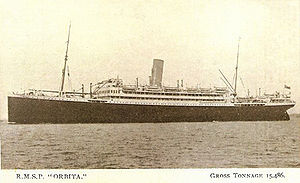SS Orbita
 The SS Orbita | |
| Career | |
|---|---|
| Name: | SS Orbita |
| Owner: | Pacific Steam Navigation Company |
| Operator: |
Cunard Line, Royal Mail Steam Packet Company, Pacific Steam Navigation Company |
| Port of registry: | Liverpool, 22x20px United Kingdom |
| Route: | North Atlantic service |
| Builder: | Harland and Wolff yards in Belfast |
| Launched: | 1915 |
| Maiden voyage: | 26 Sept. 1919 |
| In service: | 1915 |
| Out of service: | 1950 |
| Identification: | Official number 137467 |
| Fate: | Scrapped, 1950, in Newport. |
| General characteristics | |
| Class and type: | Ocean liner |
| Tonnage: | 15,486 |
| Length: | 167.7 m (550 ft) |
| Beam: | 25.5 m (67 ft) |
| Propulsion: | Triple screw[1] |
| Speed: | 15 knotts |
| Capacity: | 896 passengers |
Orbita was an ocean liner built in 1913-14 by Harland & Wolff in Belfast for the Pacific Steam Navigation Company. Her sister ships were the SS Orduna and SS Orca.[2]
She provided transatlantic passenger transport, measured approximately 15,500 gross tons, and was 550.3 ft x 67.3 ft.
Contents
History
From 1921 to 1923 the Orbita was chartered to operate the Royal Mail's United Kingdom - New York service. In 1923 she was transferred to Royal Mail ownership, remaining with them for three years before reverting to the Pacific Steam Navigation Company.[3]
Between 1946 and 1950 the Orbita was used to transport immigrants to Australia and New Zealand.[4] The Orbita was a ship that is an important part of the history of multiracialism in the United Kingdom, arriving with the second group of immigrants from the West Indies (after the Empire Windrush). The passengers were part of the first large group of West Indian immigrants to the UK after the Second World War.[5]
War service
The Orbita entered service an auxiliary cruiser and troop ship during the First World War, delaying her maiden voyage, from Liverpool to Rio de Janeiro, until 1919.[6] In 1941, during the Second World War, she was requisitioned for use as a troop ship - continuing in that role until 1946.[7]
Demise
She was dismantled in October 1950 in Newport, South Wales.[8]
References
- ↑ postcard of RMSP Orbita
- ↑ RMSPCo
- ↑ Pacific Steam Navigation Company
- ↑ Saville's Ships: Orbita
- ↑ MV Empire Windrush
- ↑ [http://www.wnccoins.com/transatlanticliners.htm TRANSATLANTIC OCEAN LINERS OF THE GILDED AGE]
- ↑ Signalman Wader´s Diary Part 6: My Journey Home
- ↑ Miramar Ship Index: SS Orbita
